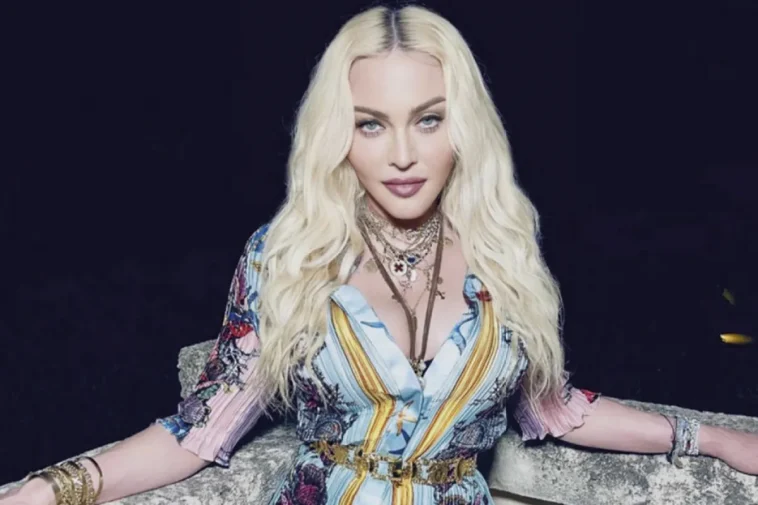Amid the struggles of the 80s, a voice burst onto the music scene, promulgating not just infectious rhythms, but a message of self-expression and liberation.
When the effervescence of pop culture combined with the fight for LGBTQIA+ rights, Madonna emerged – not just as an icon, but as a fortress of resistance and empowerment.
Rise of the Queen of Pop
With a keen sense of style and an unparalleled ability to anticipate trends, Madonna catapulted herself to stardom. It wasn't just the sound of her songs that captivated the public; it was her electrifying performance, her charisma and the way in which she defined the visual and aesthetic language of the decade. There, before the eyes of the world, the Queen of Pop began to build her imperishable kingdom.
Madonna's trajectory reflected a calculated rise, driven by hits such as “Like a Virgin” and “Material Girl”. Defying conventions and stereotypes, she reinvented her image and sound in a chameleonic way, consolidating herself as a true cultural phenomenon. Her presence was omnipresent – on the radio, on TV, on the dance floor – and her impact transcended music, influencing fashion, behavior and the fight for inclusion and acceptance of sexual diversity.
Early hits that defined an era
In the early 80s, Madonna emerged with “Holiday” e “Lucky Star”, two singles that paved the way for massive success. His unique blend of danceable pop and contemporary sensibility has set new paradigms in the music industry.
With "Borderlines" e "Like a Virgin", the artist not only dominated the charts, but also created timeless anthems that endure to this day. Each song was a step toward pop royalty, demonstrating her dexterity at capturing the zeitgeist and molding it to her unmistakable style.
Madonna turned MTV and music video culture into pillars of her iconic career.
It was impossible to ignore Madonna's presence: her ability to synthesize fashion, attitude and music into a complete show was revolutionary. Through provocative lyrics and bold (sometimes banned) visuals, she not only entertained, but also sparked profound social debates, laying the groundwork for her ever-evolving eternal reign.
Madonna in the 80s
Madonna, at the height of the 80s, launched “Material Girl” e “Papa Don’t Preach”, tracks that solidified her status as a pop icon and placed her in the global spotlight. These songs became emblems of an era marked by youthfulness and consumerist culture.
“La Isla Bonita” illustrated the singer's ability to explore new sonic territories – an ode to nostalgia and exoticism. The musical sophistication and lyrical sensitivity of “Live to Tell” highlighted Madonna's artistic maturity, which would culminate in future works.
With the iconic album True Blue, Madonna established a milestone in pop music, combining emotional ballads and dance tracks with unparalleled mastery. There is an ability to expand musical boundaries while remaining genuinely connected to the roots of traditional pop music, balancing commercial and critical views.
Madonna's influence in the 80s paved the way for artists who would emerge in the following decades. Her command over pop culture was also shown in her lyrics that addressed progressive themes of the time, setting the stage for a career full of provocations and innovations. “Like a Prayer” stands out, which, with an audacious and provocative narrative, proposed questions about faith and religious iconography, consecrating Madonna not only as a pop star, but as an avid participant in contemporary cultural discourse.
Innovations and Controversies
Madonna, as a pioneer of pop, associated herself with avant-garde movements and provoked debates. His ability to experiment with diverse styles, crossing genres and trends, has shaped the modern soundscape.
In terms of controversies, the artist has often tested the limits of what is acceptable through her performances and music videos. The video for “Like a Virgin”, with its religious and erotic allusions, was a milestone in the expression of female sexuality, challenging the conservative norms of the time.
In fact, tracks like “Papa Don't Preach” sparked dialogues around bodily autonomy and personal choices, highlighting Madonna's figure as a symbol of empowerment and liberation.
Video clips that broke taboos
Madonna not only dominated the music scene but also ventured into controversial visual narratives with her music videos.
- like a prayer – confronted religious and racial symbolism, resulting in wide repercussion and criticism.
- Justify my love – addressed themes of sexuality and fantasy, challenging norms and facing censorship.
- What It Feels Like for a Girl – challenged gender and violence stereotypes, polarizing opinions and provoking debates.
- Spindrift – celebrated LGBTQIA+ culture and the ballroom scene, significantly contributing to its mainstream visibility.
These works were essential for establishing dialogues on delicate topics, expanding their influence beyond music.
Each of these music videos marked an era and positioned Madonna as an unstoppable visionary of cultural transformation.
Madonna and the redefinition of live performance
Madonna has never been content with just singing during her live appearances; she transformed each performance into a theatrical spectacle. The intricate choreography and changing sets created an immersive experience for the audience.
Since the 80s, his presence on stage has been synonymous with innovation and boldness. The Blond Ambition tour in 1990 set new standards for pop concerts, with a complex production that included catwalks, moving staircases and a cinematic approach to the stage.
More than just shows, Madonna created narratives and discussed social themes live. Whether exploring sexuality on The Girlie Show or tackling religion on Confessions Tour, she has always pushed the boundaries of what was expected in concert.
These historic moments not only raised the bar for music touring, but also influenced generations of artists. The Queen of Pop became the ultimate reference for how a live performance could be conceived, transforming herself into an undisputed master of entertainment.
Every Madonna performance is a reminder of why she holds the music industry crown. Their ability to continually reinvent themselves live is a testament to their unshakable place in pop culture.
Global Hits of the 90s and 2000s
Entering the 90s and moving into the 2000s, Madonna continued to follow a path of inexorable success and set trends in the music scene. With releases like Spindrift (1990), which became a cultural anthem, and Frozen (1998), knocking out the global charts with her dark and evocative style, Madonna's interpretation went beyond conventional pop. In 2000, she captivated a new generation with Music, whose chorus became a viral phenomenon before viral was even a household term. Madonna's ability to combine styles, creating hybrids that capture the essence of the times while remaining timeless, solidifies her legacy as a true musical chameleon.
Iconic songs and landmark collaborations
When talking about Madonna, we must highlight her emblematic songs that transcend generations and remain vibrant in the global cultural fabric. like a prayer (1989), for example, shows the artist's power to combine political message with pop appeal, producing not just a song, but an important cultural landmark that still reverberates in many discussions about art and freedom of expression.
The Queen of Pop's innovation and charisma also stand out in her collaborations with other music icons. With Take a bow (1994), Madonna and Babyface created a sentimental ballad that speaks directly to hearts in love. Already in 4 Minutes (2008), alongside Justin Timberlake and Timbaland, she demonstrated her unique ability to integrate with new trends, remaining relevant and influential even after decades of career. These collaborations have not only expanded her repertoire, but also strengthened her role as a multidimensional artist.
Her partnerships reflected Madonna's ability to select collaborators who, while bringing freshness to her sound, maintained an affinity with her artistic vision. The duet with Prince in Love Song (1989) is a superb example of this harmony, while the co-creation with Maluma in Medellin (2019) proves its continued global appeal, reinventing itself through contemporary Latin rhythms, attracting fans beyond English-speaking borders.
Finally, it is crucial to highlight the way in which Madonna integrates elements from different cultures into her repertoire. The beautiful island (1987) is an ode to the beauty and mystique of Spanish and Latin American culture, and his collaboration with Anitta on Make it Yummy (2019), extraordinarily, brings to light the influence of Brazilian funk, thus expanding its connection with different cultural expressions. These interactions, crossing borders and musical genres, illustrate his ongoing commitment to artistic exploration and innovation.
Madonna and influence on pop culture
Madonna transcends the concept of a music star, she is a true cultural icon. Her influence on pop culture is undeniable, shaping not only music but also fashion, dance, and behavior for generations. Her image strategies and provocative performances challenged norms and paved the way for future pop stars.
Since the explosion of “Like a Virgin” in 1984, Madonna has established herself as a symbol of female empowerment. His creative autonomy and his ability to provoke debates about sexuality and religion set the standard for what we now know as a complete artist, who influences beyond the microphone and the stage.
Its impact goes beyond entertainment; Madonna is a pioneer in the field of LGBTQIA+ rights. With lyrics that celebrate diversity and freedom of expression, she has created a legacy of support and visibility, encouraging acceptance and combating stigma in a time of social and health crisis.
In terms of musical style, Madonna is constantly innovative. Her discography is marked by an incessant search for reinvention, mixing genres and collaborating with artists from different spheres. This sonic malleability has allowed her to remain relevant over several decades, while her songs reflect the cultural and political evolution of society.
Above all, Madonna is a master of the art of telling stories through her songs and music videos. Powerful visual narratives and introspective lyrics, such as “Vogue” and “Like a Prayer,” continue to inspire not only fans but also contemporary artists, perpetuating their legacy in modern culture.
Legacy and Musical Influence
Madonna, with her overwhelming presence on the global music scene, not only set trends but also shaped pop culture as we know it. A visionary in the truest sense of the word, she was responsible for popularizing dance and fashion in the context of pop music, acting as a true catalyst of styles and behaviors. Her artistic DNA permeates every layer of the music industry, and her ability to move between different cultural expressions has allowed her to achieve iconic status that transcends generations.
Throughout her career, Madonna's influence has been felt widely and deeply. From “Material Girl” to “Ray of Light”, her works represent a true compendium of references that define contemporary pop identity. The Queen of Pop not only captured the essence of her time, but also laid the foundation for the construction of music as a form of social and political expression. Artists from countless genres cite her as an inspiration, testament to the power that Madonna exerts over music, and her commitment to artistic evolution is the reason why her music remains timeless and ever-present on the world's soundwaves.
Queen of Pop records and awards
Madonna holds incredibly notable historical marks.
The collection of awards and recognition that Madonna has accumulated throughout her career is remarkable. As an artist, she set several Guinness World Records records, including the title of highest-selling female artist of all time. Additionally, she is one of the few artists to have received critical and commercial acclaim in every decade of her career.
His name resonates at the Grammy Awards.
His awards include seven Grammys – the highest recognition in the music industry – and countless MTV Video Music Awards. Her influence also extends to the Golden Globe, received for her performance in 'Evita'.
Madonna remains an indomitable cultural force.
In recent years, Madonna has been honored on several occasions, including a special inclusion in the Rock and Roll Hall of Fame in 2008. Her impact on music, culture and society remains undeniable, which is why her career is studied at universities and her achievements continue to be celebrated by fans and specialized media.
Madonna's inspiration for new generations
Madonna, without a shadow of a doubt, is a transgenerational icon, whose influence goes beyond the boundaries of time and infiltrates the art of new generations. Her audacity and continuous reinvention are beacons that illuminate the paths of emerging artists.
In this scenario, the Queen of Pop becomes an inspiring muse for the LGBTQIA+ community, symbolizing freedom of expression and representation. Over the decades, her defiant stance and approach to issues of gender and sexuality have provided a visual and performative language that encourages authenticity and breaking paradigms. Madonna's lessons guide the artistic journey of many who find in music a space of affirmation and resistance.
Notably, her legacy is manifested in the rise of talents who see in her a model of strength and pioneering spirit. From Lady Gaga to Sam Smith, many music stars recognize Madonna as a source of inspiration. Madonna's bold spirit is revived every time a new LGBTQIA+ artist steps on stage to tell their own story.
The permanence of his legacy is evidenced in the reverence of contemporary musicians who are inspired by his avant-garde attitudes. Artists on the current scene often cite Madonna as a primary influence, highlighting the crucial role she plays in the construction of modern artistic identities. The Queen of Pop not only shaped the pop music we know, but also paved the way for individual expression and diversity to be celebrated in the industry.
Madonna's Importance to the LGBTQIA+ Community
Madonna's influence on the LGBTQIA+ community is indisputable. Throughout her career, the Queen of Pop has always positioned herself as a defender of freedom of expression, equality and representation. Her defiant stance and engagement with issues of gender and sexuality have made her an inspiring muse for many members of the community.
Through her music, Madonna brought to light themes such as diversity, empowerment and acceptance. Her lyrics address issues such as identity, self-love and self-affirmation with courage and sensitivity, resonating with countless LGBTQIA+ people who identify with these messages of strength and overcoming.
In addition to her music, Madonna also used her platform to promote the LGBTQIA+ cause. In her shows and performances, she has always included artistic and visual elements that celebrate diversity and inclusion. Her innovative and bold approach to fashion and aesthetics also served as a form of expression for many LGBTQIA+ artists, who found the Queen of Pop to be an example of authenticity and courage.
Madonna also recognizes the importance of the LGBTQIA+ community in her own career. She has always had a captive and loyal following within this community, and has not hesitated to show her support and gratitude. She became involved in causes related to LGBTQIA+ rights, such as the fight against homophobia and discrimination, and was an active voice in the search for greater equality and respect.
Her influence on music and pop culture spans generations, and many contemporary LGBTQIA+ artists cite Madonna as a key inspiration. Her legacy persists not only in her music, but also in her avant-garde attitude and the breaking of paradigms that she represents. Through her boldness and continuous reinvention, she continues to be a beacon of hope and an inspiration for emerging artists.
In short, Madonna was and continues to be an icon for the LGBTQIA+ community. Her music, her attitudes and her messages of inclusion and empowerment have provided a space of affirmation and resistance for many LGBTQIA+ individuals, making her a revered and loved figure for her stance and contribution to the acceptance and celebration of diversity. Madonna's Importance to the LGBTQIA+ Community
Madonna is more than just an iconic pop music figure; she also plays a crucial role in the LGBTQIA+ community. Throughout her career, she has been a tireless advocate for free speech, equality and representation. Her defiant stance and engagement with issues related to gender and sexuality have made her a muse and a source of inspiration for many members of the community.
Through her music, Madonna brought to light themes such as diversity, empowerment and acceptance. Her courageous and sensitive lyrics address issues such as identity, self-love and self-affirmation, resonating with countless LGBTQIA+ people who identify with her messages of strength and overcoming.
In addition to her music, Madonna also used her platform to promote the LGBTQIA+ cause. In her shows and performances, she always includes artistic and visual elements that celebrate diversity and inclusion. Her innovative and bold approach to fashion and aesthetics has also served as a form of expression for many LGBTQIA+ artists, finding in the Queen of Pop an example of authenticity and courage.
Madonna recognizes the importance of the LGBTQIA+ community in her own career. She has always had a loyal following within this community and has not hesitated to show her support and gratitude. She became involved in causes related to LGBTQIA+ rights, such as the fight against homophobia and discrimination, being an active voice in the search for greater equality and respect.
Her impact on music and pop culture spans generations, and many contemporary LGBTQIA+ artists cite Madonna as a key inspiration. Her legacy is not just limited to her music, but also to her avant-garde attitude and the disruption of paradigms that she represents. Through her audacity and continuous reinvention, she remains a beacon of hope and an inspiration for emerging artists.
Madonna is a true icon for the LGBTQIA+ community. Her music, her attitudes and her messages of inclusion and empowerment provide a space of affirmation and resistance for many LGBTQIA+ individuals, making her a revered and loved figure for her stance and contribution to the acceptance and celebration of diversity.



